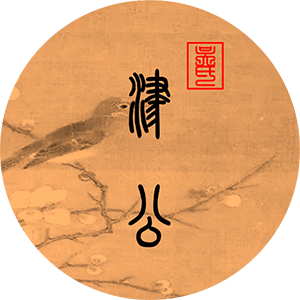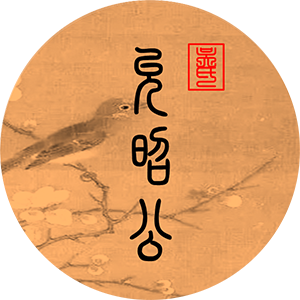
Wu Jian (1213-1276), courtesy name Yan Kai, self-titled Shitang, was a native of Wu village in the present-day Guanlu Houli. His father, Wu Huan courtesy name Yaoqing, attained Jinshi degree in the 1st year of the Jia Ding reign (1208) and became the head of Yuelu Mountain School (or Yuelu Academy. This was one of the four most famous academies in the Southern Song Dynasty, where Zhu Xi had once lectured. It had more than a thousand students at its peak). No doubt influenced by this family tradition, Wu Jian read a great deal from childhood onwards, and he was especially “familiar with the books of the Spring and Autumn《春秋》”. In the 13th year of the Jia Ding reign (1223), when he was 10 years old, he went to Changsha with his father to study at the Yuelu Academy (岳麓书院) with Master Shu and Master Li, two great teachers praised as “two true masters of Yuelu mountain”. For this reason, Wu Jian could later claim with justice, that he had “sat at the feet of Master Zhu”. In the 4th year of Chungyou (1244), he attained jinshi degree. Following this success, he first served as the secretary of Kunshan (now Kunshan City, Jiangsu Province). He made little of his relatively lowly position and fulfilled his duties without complaint, becoming an effective teacher. He insisted on giving lectures to the students at the school every day and followed the example of Zhu Xi during his tenure as the chief magistrate in Tong’an County. He made it a priority to promote good manners and correct human moral shortcomings, clarify what was righteous and profitable, and prevent evil. During the period he was in office, he did many good things bringing about significant changes in the conduct of social affairs. When he left, the people of Kunshan erected a monument, enshrining him as a famous official.
After this, he served in many positions: Advisor of Ministry of Ceremony(太常博士), Librarian of National Academy (秘书郎), Vice Magistrate of Yanzhou County (严州通判), Prefect of Pingjiang Province (平江知府), Junior Minister of Ministry of Ceremony (太常少卿), Minister of Huawenge (华文阁) [adjunct transfer agent (转运使) of Fujian], Minister of Historical Writings (著作郎) [adjunct Minister of Rituals and Prince’s Secretary], and Minister of the Ministry of Civil Officials [Adjunct Chancellor of National Academy]. As Wu Jian’s authority grew, he became an important official of the imperial court by the time of the Emperor Du. Later still, he was “appointed to the Ministry of Internal Affairs and returned to his hometown” where he enjoyed “the pleasures of the pond, the garden and the pavilion”.
After the death of Emperor Du in 1274, Emperor Gong succeeded to the throne at the age of four, with his grandmother, the Empress Dowager Xie Daoqing(谢道清), taking charge of the government. Empress Dowager Xie Daoqing was a native of Linhai, and Wu Jian was her cousin's husband (Wu Huan was a friend of Guo Leiqing, a famous official of Duanping. The two families were united by marriage. Guo Anniang, the daughter of Leiqing, was married to Wu Jian. The Empress Xie Daoqing of Li Zong was the niece of Guo Leiqing, the cousin of Wu Jian's wife Guo Anniang). The situation had already deteriorated due to the wickedness of the traitor Jia Sidao (贾似道, statesman of the Southern Song dynasty who achieved great power over the throne after his sister became a concubine of the emperor Lizong, In charge of Mongol affairs, he followed a policy of placating these Central Asian tribes and has therefore traditionally been held responsible for the final Mongol subjugation of southern China in 1279, which led to the establishment of the Yuan dynasty. Jia has also been faulted for his total domination of the throne under Lizong’s successor, the emperor Duzong) The powerful Yuan army with sturdy horses, led by Bo Yan, was heading straight south to Lin’an. The Southern Song Dynasty was in great danger. At this critical moment, Empress Dowager Xie decided to reappoint Wu Jian.
In the 12th month of the 1st year of Deyou (1275), Empress Dowager Xie made Wu Jian the Deputy Minister of the Privy Council, where he was in charge of the military administration of the Privy Council. At the beginning of the 1st month of the following year, the Yuan army intensified its offensive, with Huzhou and Jiaxing falling one after another, Lin'an being besieged on three sides. The Yuan army captured Gaoting Mountain, a very important area 30 miles north-east of Lin'an.
One after the other, the Left and Right Grand councilors of the Southern Song Dynasty, Liou Mengyan and Chen Yizhong, fled away. People were afraid, not knowing whether to fight or to surrender. At this time of crisis, Wu Jian was appointed as the Left Grand Councilor and Privy Counsellor, whose official responsibility was to oversee the revision of state history. The appointment of the Chancellor (here refers to the appointment of Left Grand Councilor and Privy Counsellor) was worth of a grand celebration. But when the Yuan army came swarming down on them, the Prime Minister (referring to Liou Mengyan and Chen Yizhong) was the one leading the escape and naturally enough, therefore, one after another, other officials also fled. On the day the Emperor's edict was announced, “only six people from amongst the civil officials” were present in the Hall of Xuan Yuan. It was a bleak picture. As the orphaned emperor was young and ignorant, and the Empress Dowager Xie, old and widowed, Wu Jian, as Chancellor, was forced to shoulder a heavy responsibility.
On the 19th day of the first month in 1275, the Southern Song court appointed Wen Tianxiang(文天祥) as the Right Grand Councilor and dispatched him and Wu Jian to the Yuan camp to negotiate peace and “beg for the survival of the territory” in the hope that the Yuan army would retreat and allow the Song regime to continue. When he arrived at the Yuan camp, Wen Tianxiang took the moral high ground, sternly rebuking the Yuan Prime Minister Bo Yan. Bo Yan was enraged. Not only did he refuse to negotiate peace, but he detained Wen Tianxiang. Wu Jian had no other recourse but to return to Lin'an and report this to the Empress Dowager. Ultimately the Song Imperial had to surrender “for the sake of the suzerainty”. They sent Wu Jian and Jia Yuqing as ambassadors to the Dadu (Yuan capital, now Beijing) to present the form of surrender. At the same time, an edict was issued instructing the whole country to surrender to Yuan. The Zhao Song regime, which had been in existence for more than 300 years, had fallen.: “The country had lasted for three hundred years, and no remnants of it have been left behind”. Wu Jian was forced to go north with the Yuan army and died in Dadu that year at the age of 64. His coffin was taken back to his hometown, escorted by his son and buried in Xi Ao in the western suburbs of the county. The people of the time composed a poem: When the pillar of the sky tilted dangerously, who can accompany with the six horses. He has been able to lay down his life in service to the Imperial Sovereign. After death his body returns home, with his son. In the desert smoke blows away and the wind dies down. The land and its borders are changed. Though he is dead, it still dwells in his heart.
家谱传记
地方志
国史记载



